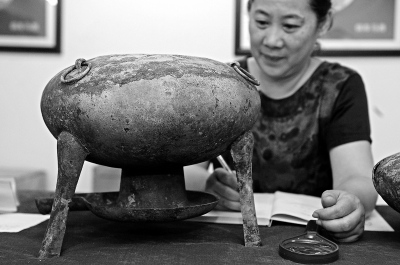
A bronze pot containing chestnuts was unearthed in a 2,000-year-old tomb. (Photo/Xinhua)
The discovery of a bronze pot containing chestnuts, unearthed in a 2,000-year-old tomb, may further prove the popularity of China's hot pot cuisine among ancient aristocrats.
The three-leg vessel was found in the tomb of "Haihunhou" (Marquis of Haihun) dating back to the Western Han Dynasty (206 BC - 24 AD). It was identified as a hot pot as a charcoal plate was attached to its bottom to keep the broth simmering while being served, said Zhang Zhongli with the excavation team of the Haihunhou cemetery, located in Jiangxi Province.
Charcoal traces and food residue, including the chestnuts, indicate the vessel had been used before it was buried.
"It is very likely that the tomb's owner was a hot pot lover, so he had his hot pot buried with him," Zhang told Xihua.
It was tradition in ancient China for treasures and favorite items to be buried with the deceased. Also found in the tomb were gold, jewels, and two chariots.
Though hot pot dinners are popular in modern China, they were rarely seen on the dinner tables of commoners about 2,000 years ago, as such containers were only found in tombs of the noble, Zhang explained.
Yet some researchers have questioned the utensil's real use. Hu Dongbo, also in the team, said the plate could not hold sufficient fuel for boiling and might actually serve to keep the food from cooling down.
Experts are now collecting food residue in the vessel for further tests, Zhang said.
The Haihunhou cemetery covers roughly 40,000 square meters and contains eight tombs and a chariot burial site. It is the most complete Western Han Dynasty cemetery ever discovered in China.
Its main tomb is suspected to belong to Liu He, grandson of Emperor Wu, whose reign ushered in one of the most prosperous periods in China's history. Liu was given the title "Haihunhou" after he was deposed as emperor after only 27 days, dethroned by the royal clan because of his lack of talent and morals. Haihun is the ancient name of a very small kingdom in the north of Jiangxi.


















































